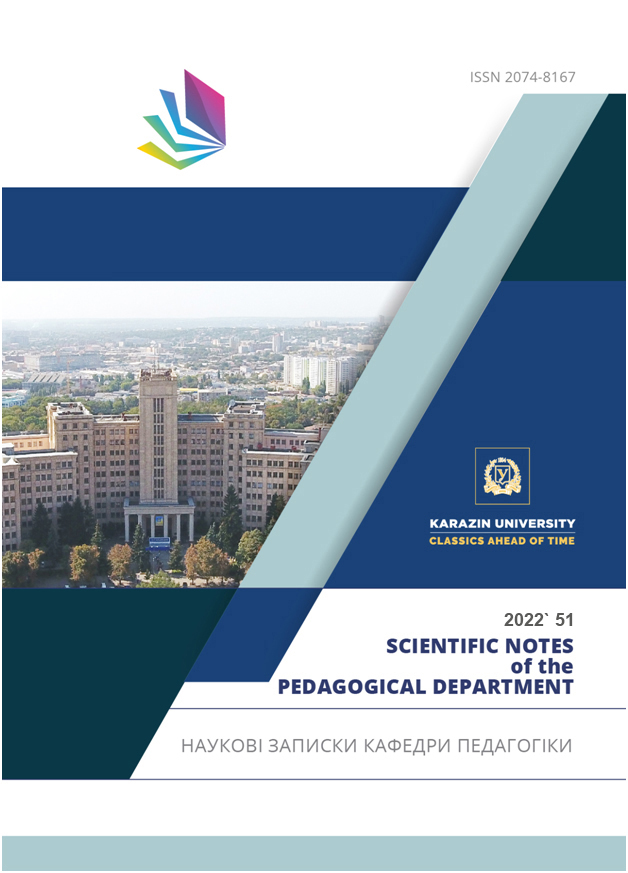Levels of education in the People’s Republic of China
Abstract
The rapid development of the economic potential of the People’s Republic of China arouses great interest in the study of the educational system of this country. Education is the basis of any kind of economic and social growth, and in order to understand these processes, it is necessary to clearly understand the levels of training of students at all stages of education. The purpose of the study is to analyze and determine the levels of education in the People’s Republic of China. Research methods consisted of: theoretical research methods: analysis of reference, legal, psychological-pedagogical and educational-methodical literature and generalization of these data in accordance with the purpose of the research. During the study, it was determined that the system of formal education in the PRC includes a number of levels such as the school level divided into 3 levels, then there is the level of university education, which is divided into two levels, bachelor and master, and there is also a postgraduate/doctoral level. Separately, it is necessary to highlight professional colleges and specialized colleges aimed at training specialists in various spheres of the national economy. That is, we see a system of education levels very similar to the Ukrainian one, which greatly simplifies the perception and adaptation of applicants who come to study in the PRC and vice versa. Separately, it is necessary to say about the years of study in higher education, where there are some differences in the link of master’s and postgraduate studies, where they are allocated up to 4 years, which differs from the Ukrainian version by a maximum of 1.8. years in master’s and 4 and 2 in postgraduate and doctoral studies.
Downloads
References
/References
Brandenburg U. & Zhu Jia-ni. Higher education in China. 2007. URL: http://www.che.de
CERNET. URL: http://www.edu.cn/20010101/21778.shtml
Education China. Education China 2007. URL: http://www.edu.cn/20041203/3123354.shtml
Finnish National Board of Education 2007: Finnish National Board of Education: Higher Education in the People’s Republic of China; http://www.edu.fi/julkaisut/chinaedu.pdf, last retrieval April 22, 2007
MoE. Ministry of Education report for 2005. 2005. URL: http://www.moe.edu.cn/edoas/website18/info15425.htm
Mohrman K. Higher Education Reform in Mainland Chinese universities: An American’s Perspective, Chinese University Hongkong 2003. URL: http://www.saisjhu.edu/Nanjing/downloads/Higher_Ed_in_China.pdf.
Nanzhao, Z., Muju, Z., Baohua, Y., Xia, G., Wenjing, W., & Li, Z. (2007). Educational reform and curriculum change in China: A comparative case study. International Bureau of education. URL: http://www.ibe.unesco.org/ fileadmin/user_upload/COPs/Pages_documents/Comparative_Research/EduReformChina.pdf
Netherlands Education Support Office Beijing 2005. Netherlands Education Support Office Beijing: Perceptions of European higher education in third countries. A study carried out by the Academic Cooperation Association. China Country Report, prepared for Academic Cooperation Association, Brussels 2005.
Song H. Sleeping giant: Chinese Teacher Education System Past, Present and Future. 2008. URL: http://search. proquest.com/docview/214626657/75080B414B4A40B9PQ/3?accountid=8554
Su Z.X., Hawkins J., Huang T. & Zhao Z.Y. Choices and commitment: Acomparison of teacher candidates& profiles and perspectives in China and the United States. International Revieiv of Education. 2001. 47(6). P. 611-63
Yan H. Teacher training in China and a practical model: e-Training Community (eTC). Campus-Wide Information Systems. 2009. 26(2). P. 114-121.https://doi.org/10.1108/10650740910946837
Young E. E., Grant P. A., Montbriand C., & Therriault D. J. Educating Preservice Teachers: The State of Affairs. 2002. North central regional Educational laboratory: Illinois.
Zhou J. Teacher education changes in China: 1974–2014. Journal of Education for Teaching. 2014. 40(5). P. 507- 523
Zhou N. & Zhu M. Educational Reform and Curriculum Change in China: A Comparative Case Study. 2007. URL: http://www.ibe.unesco.org/fileadmin/user_upload/COPs/Pages_documents/Comparative_Research/ EduReformChina.pdf
Zhou Z.Y. The teaching profession: To be or to do? Journal of Education for Teaching. 2002. 28. P. 211-215.
Zhu X. & Cilin L Teacher training for moral education in China. Journal of Moral Education. 2004. 33(4). P. 481-494. https://doi.org/10.1080/0305724042000315608
Zhu X. & Han X. (2006). Reconstruction of the Teacher Education System in China. International education journal. 7(1). P. 66-73.
Brandenburg U. & Zhu Jia-ni. Higher education in China. 2007. URL: http://www.che.de
CERNET. URL: http://www.edu.cn/20010101/21778.shtml
Education China. Education China 2007. URL: http://www.edu.cn/20041203/3123354.shtml
Finnish National Board of Education 2007: Finnish National Board of Education: Higher Education in the People’s Republic of China; http://www.edu.fi/julkaisut/chinaedu.pdf, last retrieval April 22, 2007
MoE. Ministry of Education report for 2005. 2005. URL: http://www.moe.edu.cn/edoas/website18/info15425.htm
Mohrman K. Higher Education Reform in Mainland Chinese universities: An American’s Perspective, Chinese University Hongkong 2003. URL: http://www.saisjhu.edu/Nanjing/downloads/Higher_Ed_in_China.pdf.
Nanzhao, Z., Muju, Z., Baohua, Y., Xia, G., Wenjing, W., & Li, Z. (2007). Educational reform and curriculum change in China: A comparative case study. International Bureau of education. URL: http://www.ibe.unesco.org/ fileadmin/user_upload/COPs/Pages_documents/Comparative_Research/EduReformChina.pdf
Netherlands Education Support Office Beijing 2005. Netherlands Education Support Office Beijing: Perceptions of European higher education in third countries. A study carried out by the Academic Cooperation Association. China Country Report, prepared for Academic Cooperation Association, Brussels 2005.
Song H. Sleeping giant: Chinese Teacher Education System Past, Present and Future. 2008. URL: http://search. proquest.com/docview/214626657/75080B414B4A40B9PQ/3?accountid=8554
Su Z.X., Hawkins J., Huang T. & Zhao Z.Y. Choices and commitment: Acomparison of teacher candidates& profiles and perspectives in China and the United States. International Revieiv of Education. 2001. 47(6). P. 611-63
Yan H. Teacher training in China and a practical model: e-Training Community (eTC). Campus-Wide Information Systems. 2009. 26(2). P. 114-121.https://doi.org/10.1108/10650740910946837
Young E. E., Grant P. A., Montbriand C., & Therriault D. J. Educating Preservice Teachers: The State of Affairs. 2002. North central regional Educational laboratory: Illinois.
Zhou J. Teacher education changes in China: 1974–2014. Journal of Education for Teaching. 2014. 40(5). P. 507- 523
Zhou N. & Zhu M. Educational Reform and Curriculum Change in China: A Comparative Case Study. 2007. URL: http://www.ibe.unesco.org/fileadmin/user_upload/COPs/Pages_documents/Comparative_Research/ EduReformChina.pdf
Zhou Z.Y. The teaching profession: To be or to do? Journal of Education for Teaching. 2002. 28. P. 211-215.
Zhu X. & Cilin L Teacher training for moral education in China. Journal of Moral Education. 2004. 33(4). P. 481-494. https://doi.org/10.1080/0305724042000315608
Zhu X. & Han X. (2006). Reconstruction of the Teacher Education System in China. International education journal. 7(1). P. 66-73.
Citations
Education in China: Challenges and Prospects of the XXI Century
Nalyvaiko Oleksii & Nalyvaiko Natalya (2024) Educological discourse
Crossref

